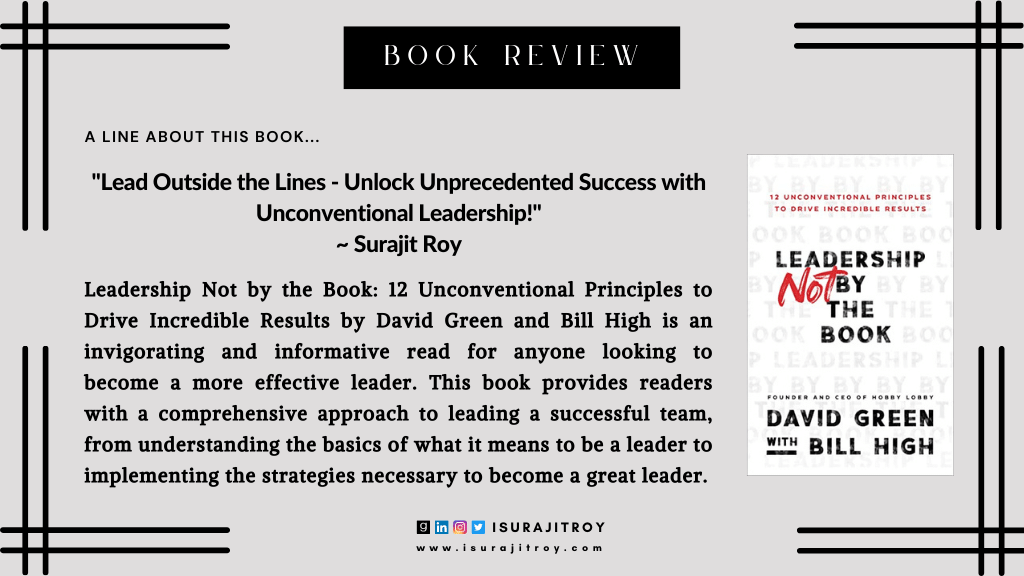
“Lead Outside the Lines – Unlock Unprecedented Success with Unconventional Leadership!”
Surajit Roy
Leadership Not by the Book: 12 Unconventional Principles to Drive Incredible Results by David Green and Bill High is an invigorating and informative read for anyone looking to become a more effective leader. This book provides readers with a comprehensive approach to leading a successful team, from understanding the basics of what it means to be a leader to implementing the strategies necessary to become a great leader.
One of the greatest strengths of Leadership Not by the Book is its focus on the importance of developing and nurturing relationships. The authors emphasize the need for leaders to have strong communication skills and to be able to connect with their team members. They also provide guidance on how to foster trust and respect within a team and how to empower team members to take ownership of their work. This is an invaluable resource for any leader looking to create a successful, collaborative team.
Book Details
| Book Title | Leadership Not by the Book: 12 Unconventional Principles to Drive Incredible Results |
| Author | David Green and Bill High |
| Book Genres | Non Fiction |
| Category | Self-Help for Success |
| My Rating | 4.8 |
About The Author
Mark David Green
Mark David Green is a British author from Poole, on the UK’s south coast. He is best known for his series of travel-related books, The Travel Auction. In addition to his writing career, he and his wife of many years enjoy a more simple lifestyle, often taking to the water in their small sailing boat. Mark prefers to write in the tiny forward cabin of their vessel, finding the cozy environment to be the perfect place to hone his craft.
Mark has a dream that one day his first book will be adapted into a romantic comedy for the big screen. He believes that the combination of comedy, travel, and romance will make for an entertaining and meaningful story. Despite his humble beginnings, Mark has managed to carve out a successful writing career and is now in high demand for his unique stories and perspectives.
Bill High
Bill High is the Executive Chairman & Founder of The Signatry, a Global Christian Foundation. Through his work with families, individual givers, and financial advisors, Bill shares the Foundation’s message regarding biblical generosity, stewardship in the church, and charitable giving. He is a highly sought-after author and speaker on the topics of generosity and family legacy and specializes in coaching families and their advisors for generational success.
Prior to The Signatry, Bill was a partner with a national and international law firm, Blackwell Sanders LLP. He currently remains of counsel with the law firm Sanders Warren & Russell LLP. He is also the founder of two tech companies, iDonate.com and FamilyArc.
Originally from the Ozark Mountains in Missouri, Bill’s life was transformed by stories in a children’s Bible story book. He believes that the power of story can transform lives, create a lasting legacy, and spark joyful generosity. Through his work, Bill is helping to ensure that the stories of the Bible continue to shape and impact generations to come.
Book Summary
Leadership Not by the Book, written by David Green and Bill High, is a comprehensive guide to effective and innovative leadership. The authors argue that traditional leadership models are often outdated and ineffective, and they provide twelve principles that they argue are essential for leaders to be successful.
Overall, Leadership Not by the Book is an in-depth look at the principles of effective leadership. The authors provide practical advice and tips on how to develop and implement these principles in order to drive incredible results.
Book Highlights
At its core, Leadership Not by the Book is a guide to understanding the fundamentals of effective leadership. It begins by introducing the authors’ leadership style, which is based on the principles of authenticity, self-awareness, and empathy. This is followed by an exploration of the importance of having a clear vision and executing it effectively. The authors then provide readers with a step-by-step approach to building and maintaining a successful team, which includes creating a strong team culture, developing meaningful relationships, and inspiring team members to strive for excellence. Throughout the book, the authors also provide practical advice on how to handle challenging situations, such as difficult conversations, dealing with conflict, and making difficult decisions.
The first principle is to focus on relationships. The authors argue that to be effective, leaders must build relationships with their team and understand how their team members work. They argue that leaders should focus on understanding the individual needs of their team and creating an environment that promotes trust and collaboration.
The second principle is to create a vision. The authors argue that a strong vision is essential for successful leadership, as it provides a sense of direction and purpose for the team. They emphasize the importance of creating a vision that is ambitious yet realistic and achievable, and they provide tips on how to develop and communicate a strong vision.
The third principle is to be decisive. The authors argue that effective leaders must be able to make difficult decisions quickly and confidently. They provide tips on how to make decisions in the face of uncertainty and how to make decisions that are in the best interest of the team.
The fourth principle is to remain flexible. The authors argue that effective leaders must be able to adapt to changing circumstances and that they should always be open to new ideas and perspectives. They emphasize the importance of remaining open-minded and being willing to change direction when necessary.
The fifth principle is to maintain situational awareness. The authors argue that effective leaders must be aware of their surroundings and be able to anticipate potential problems or opportunities. They provide tips on how to stay informed and alert and how to develop strategic plans that take into account potential risks.
The sixth principle is to be transparent. The authors argue that effective leaders must communicate openly and honestly with their team. They emphasize the importance of transparency in the decision-making process and providing honest feedback.
The seventh principle is to create a culture of learning. The authors argue that leaders must create an environment where learning and growth are encouraged. They emphasize the importance of providing team members with opportunities to develop their skills and knowledge and of providing feedback and support.
The eighth principle is to create a culture of accountability. The authors argue that effective leaders must hold their team accountable for their actions and results. They emphasize the importance of setting clear expectations and providing feedback and support.
The ninth principle is to embrace change. The authors argue that effective leaders must be able to adapt to changing circumstances and be open to new ideas and perspectives. They provide tips on how to manage change and how to create an environment that is open to innovation and growth.
The tenth principle is to foster collaboration. The authors argue that effective leaders must create an environment of collaboration and trust between team members. They provide tips on how to foster collaboration and how to create an environment that encourages innovation and growth.
The eleventh principle is to lead with courage. The authors argue that effective leaders must be willing to take risks and make tough decisions. They emphasize the importance of having the courage to make difficult decisions, even in the face of criticism.
The twelfth principle is to stay humble. The authors argue that effective leaders must be humble and recognize their own limitations. They emphasize the importance of remaining humble and of being willing to accept criticism and learn from mistakes.
Conclusion
Overall, Leadership Not by the Book is an excellent read for anyone looking to become a great leader. It is written in an engaging and accessible style and provides readers with a comprehensive approach to leading a successful team. The authors’ focus on the importance of building relationships and fostering trust is particularly helpful, and their step-by-step guide to building a successful team is invaluable. Whether you’re a seasoned leader or just starting out, Leadership Not by the Book is an essential resource for any aspiring leader.





